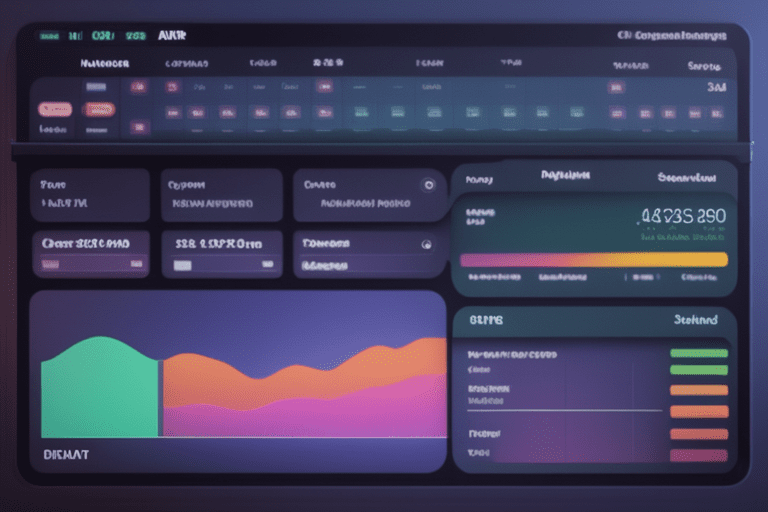Guide to CRM Software Training
Guide to CRM Software Training
Choosing the right training provider, customizing training, measuring effectiveness, and overcoming challenges are all important for successful implementation of CRM software training.
Choosing the right training provider, customizing training, measuring effectiveness, and overcoming challenges are all important for successful implementation of CRM software training.
Despite its significance, if CRM systems are not used properly, they won't drive business success.
Despite its significance, if CRM systems are not used properly, they won't drive business success.
CRM training empowers teams to effectively use CRM systems, offering several benefits:
CRM training empowers teams to effectively use CRM systems, offering several benefits:
- Enhanced customer engagement through personalized experiences and timely responses across various communication channels.
Improved sales performance with better customer data management, lead tracking, and customized pitches.
Access to valuable customer insights by analyzing CRM data for trends, behaviors, and preferences.
Improved coordination between sales and marketing teams through shared platforms and feedback.
Different types of CRM training programs cater to varying needs:
Different types of CRM training programs cater to varying needs:
On-site training delivers personalized sessions at the company's location.
Online training offers flexibility with remote access to training materials.
Customized training tailors content to the company's unique CRM implementation and processes.
Vendor-specific training is provided by the CRM software provider or partners.
Certification programs validate participants' expertise in using CRM software.
Best practices for successful CRM training include:
Best practices for successful CRM training include:
Setting clear objectives and goals for the training program.
Engaging employees by communicating the benefits and involving them in the planning process.
Providing ongoing support through help desks, forums, and follow-up sessions.
Encouraging hands-on practice through interactive exercises and simulations.
Challenges in CRM training can be addressed by:
Challenges in CRM training can be addressed by:
Addressing resistance to change by communicating benefits and involving employees in decision-making.
Addressing data privacy and security concerns through emphasizing security measures.
Aligning CRM training with business practices through customization and collaboration.
Emphasizing the value and benefits of CRM training to overcome skepticism and time constraints.
CRM training is a dynamic driver of enhanced customer relationships and operational excellence, leading to customer satisfaction, growth, and success.
CRM training is a dynamic driver of enhanced customer relationships and operational excellence, leading to customer satisfaction, growth, and success.

The Essential Role of CRM Training: Navigating Challenges and Cultivating Excellence
The Essential Role of CRM Training: Navigating Challenges and Cultivating Excellence
In the bustling landscape of modern business, the absence of CRM skills and software training casts a shadow over potential success. This void leads to challenges like low user adoption, process inefficiencies, and compromised data quality. These challenges, left unchecked, can undermine both growth strategy and customer satisfaction, echoing across every facet of an organization.
Navigating the Challenge of Inadequacy:
Navigating the Challenge of Inadequacy:
Imagine an intricate maze where untrained employees navigate the labyrinthine complexities of a CRM system and software without a guide. This scenario often results in employees struggling to locate features, grapple with data entry, and overlook crucial functionalities. Such struggles not only hinder efficiency but also result in missed opportunities for effective customer service.
Inaccurate Data: A Costly Consequence:
Inaccurate Data: A Costly Consequence:
The absence of proper training extends its impact to data integrity—a cornerstone of successful CRM. Without training, employees are prone to errors in data entry, leading to discrepancies that ripple across the system. The implications range from misguided personalization to skewed marketing campaigns, ultimately undermining the trust customers place in accurate interactions.
Customer Dissatisfaction: A Dire Outcome:
Customer Dissatisfaction: A Dire Outcome:
Inadequate CRM skills amplify customer service challenges. Untrained employees might overlook critical customer history, leading to repetitive queries and diminished satisfaction. Software features designed to enhance customer engagement go untapped, resulting in disconnected interactions and dissatisfied customers, eroding loyalty and reputation.
Illumination Through Training:
Illumination Through Training:
Conversely, well-executed CRM training illuminates this path. Proficiently trained employees navigate the software with confidence, leveraging its features to glean insights and execute actions seamlessly.
Enhanced Processes in Harmony:
Enhanced Processes in Harmony:
Proficient employees synchronize processes harmoniously within the CRM ecosystem. Tasks that once seemed burdensome now flow effortlessly, with optimized workflows and streamlined execution.
Data Integrity as a Pillar:
Data Integrity as a Pillar:
Well-trained employees become stewards of data integrity, ensuring that customer insights remain untainted. Personalization gains precision, marketing campaigns hit their target, and businesses harness the power of refined customer data.
Cultivating Customer Satisfaction:
Cultivating Customer Satisfaction:
Trained employees merge software capabilities with customer interactions, creating memorable engagements. Customer histories morph into tools for crafting personalized experiences client relationships attract customers that foster loyalty and advocacy.
Performance and Training Interwoven:
Performance and Training Interwoven:
A Salesforce survey highlights the symbiotic relationship between training and performance. Employees proficient in CRM software are 2.5 times more likely to excel. This knowledge empowers confident and competent interactions that elevate performance.
The choice is clear: navigate the labyrinth of challenges stemming from inadequate CRM skills or champion the path of training. The latter, illuminated by skilled employees, leads to efficient processes, reliable, data analytics, and customer satisfaction. As businesses stand at this crossroads, the importance of CRM software training becomes a beacon—unlocking excellence, bolstering customer relationships, and steering the ship of success toward uncharted horizons.
Types of Customer Relationship Management Software Training
Types of Customer Relationship Management Software Training
There are several types of CRM software training available, including on-site training, online training courses, classroom training courses, certification courses, and self-paced training. Each type of financial management and training has its advantages and disadvantages, depending on the business's needs and resources.
On-site training involves a trainer coming to the business's location to provide hands-on training to employees. This type of training is ideal for businesses that have a large number of employees who need to be trained at the same time. On-site training is also beneficial for businesses that want to customize their training based on their specific needs.
Online training involves web-based training modules that employees can access from anywhere with an internet connection. This type of training is ideal for businesses with remote employees or those who want to provide training at a lower cost.
Classroom training involves employees attending training sessions at a training center. This type of training is ideal for businesses that want to provide hands-on training in a traditional classroom setting.
Self-paced training involves employees accessing training modules at their own pace. This type of training is ideal for businesses that want to provide flexibility to their employees and allow them to learn at their own pace.
Choosing the Right CRM Software Training Provider
Choosing the Right CRM Software Training Provider
Choosing the right CRM software training provider is critical for the success of the training. When selecting a completed CRM software training provider, businesses should consider several factors, such as the experience and expertise of trainers, evaluation of course materials, and previous client reviews.
Businesses should choose a training provider that has experience working with sales professionals in the specific CRM software they use and has a track record of delivering effective training. Trainers should be certified in the software and have experience working with sales professionals and marketing managers in businesses of similar size and industry.
Businesses should also evaluate the course materials provided by the training provider to ensure they are comprehensive, up-to-date, and relevant to the business's needs. The training provider should also provide post-training support to help employees apply what it professionals that they have learned in real-world scenarios.
Lastly, businesses using online certification courses should consider previous client reviews to ensure the training provider has a good reputation for delivering high-quality training that meets their client's needs.

Customizing CRM Software Training
Customizing CRM Software Training
Customizing your CRM training and software training is essential for businesses to ensure their employees receive training that meets their specific needs. Customized training can include incorporating real-life scenarios, providing hands-on training, and offering follow-up support.
Incorporating real-life scenarios into the training helps employees understand how to use the software in real-world situations. It also allows them to practice using the software in a safe environment, which can increase their confidence in using it.
Providing hands-on training is essential for employees to learn how to use the software effectively. Hands-on training allows employees to practice using the software while receiving feedback from the trainer.
Offering follow-up support after the training is complete is also critical for employees to apply what they have learned in their day-to-day work. Follow-up support can include ongoing training, coaching, and access to support resources.
Case Study: Customizing CRM Software Training for a Growing E-commerce Business
Case Study: Customizing CRM Software Training for a Growing E-commerce Business
As a small e-commerce business began to grow, the team realized they needed a more CRM system and software to manage their customer relationships effectively. However, the team members were not familiar with using most CRM systems or software, and the company’s unique needs required a customized training program.
The training provider worked with the company to understand their specific business processes and goals. They then designed a customized training program that incorporated real-life scenarios in depth knowledge and hands-on training to address the company’s specific needs.
The training program also included follow-up support to ensure the team members could apply what they learned about inbound marketing strategy and marketing tools and strategy to their daily work. As a result of the customized training program, the team members were able to use the CRM software effectively and efficiently, leading to increased productivity and customer satisfaction.
The company also measured the effectiveness of the training program through assessments and surveys, gathering feedback from employees, and monitoring performance metrics. They found that the customized training program resulted in a significant increase in employee engagement and a measurable improvement in key performance indicators.
Customizing the CRM solution and software training helped the e-commerce business successfully implement the software and achieve its business goals.
Measuring the Effectiveness of CRM Software Training
Measuring the Effectiveness of CRM Software Training
Measuring the effectiveness of CRM software training is critical for businesses to ensure they are getting a return on their investment. There are several ways to measure the effectiveness of the training, such as conducting assessments and surveys, gathering feedback from employees, and monitoring performance metrics.
Assessments and surveys can help businesses determine if their sales teams and employees have learned the necessary skills to use the software effectively. Gathering feedback from their sales hub and employees can help businesses understand their employees' experience with the training and identify areas for improvement.
Monitoring performance metrics, such as data quality, user adoption, and customer satisfaction, can help businesses measure the impact of the training on their business outcomes.
Best Practices for Effective CRM Software Training
Best Practices for Effective CRM Software Training
Providing ongoing training and support, encouraging employee engagement, using marketing automation tools, incorporating gamification and rewards, and offering certifications administrator certification and career development opportunities are some of the best practices for effective CRM software training.
Providing ongoing training and support is essential as it professionals enough for employees to continue to improve their skills and stay up-to-date with new features and updates to the software.
Encouraging employee engagement can increase their motivation to learn and apply what they have learned in their day-to-day work.
Incorporating gamification and rewards can make the training more engaging and interactive, increasing the likelihood of employees retaining what they have learned.
Offering certifications online courses and career development opportunities can also increase employee motivation and engagement and provide a clear path for employees to advance their careers.

Overcoming Common Challenges in CRM Software Training
Overcoming Common Challenges in CRM Software Training
Resistance to change, lack of employee engagement, and time constraints are some of the common challenges businesses may face when implementing CRM software training. To overcome these challenges, businesses can provide clear communication about the benefits of the training, involve employees in the training design process, and provide flexibility in the training schedule.
Successful Implementation of CRM Software Training
Successful Implementation of CRM Software Training
Successful implementation of CRM software training requires careful planning and execution. Before implementing the training, businesses should ensure they have the necessary resources, such as trainers, course materials, and support resources.
Guidelines for successful implementation include providing clear communication about the training, ensuring employees have the necessary equipment and access to the software, and providing ongoing support and resources after the training is complete.
To maintain the effectiveness of the training, businesses should regularly evaluate the training program and whether professionals make necessary updates and improvements based on employee feedback and business outcomes.
Conclusion: Empowering Businesses through CRM Software Training
Conclusion: Empowering Businesses through CRM Software Training
In a landscape where businesses are propelled by the momentum of customer-centricity, CRM software training emerges as the linchpin of success. Its significance reverberates across industries and niches, with businesses relying on its transformative potential to navigate the intricacies of modern customer interactions. CRM software training is more than a mere practice—it is the catalyst that elevates operational efficiency, fosters enduring customer relationships, and fuels remarkable growth trajectories.
At its core, in the CRM industry, software training embodies the bridge between software capability and the power platform user empowerment. The intricate functionalities of CRM systems can only manifest their true value when operating systems are wielded by proficient hands. The importance of training lies not merely in the acquisition of skills, but in the cultivation of a mindset—an understanding that every interaction is an opportunity, every data point a stepping stone to enhanced customer engagement.
Customization:
Just as a tailor crafts a suit to fit perfectly, customized training aligns with the unique contours of each business. By infusing training sessions with real-life scenarios and hands-on experiences, employees transcend theoretical knowledge to practical mastery. Customized training speaks the language of the business, unraveling solutions that resonate with the nuances of operations.
Measuring Effectiveness:
The compass of progress is directed by measuring the effectiveness of CRM software training. Assessments, surveys, and performance metrics illuminate the path forward, helping businesses gauge their trajectory and refine their training strategies. It is in the diligent measurement of outcomes that businesses uncover the gems of insight, guiding them toward continuous improvement.
Ongoing Training and Support:
Like a sturdy foundation, ongoing training, certification exams, and support sustain the edifice of knowledge. The world of technology is an ever-evolving realm, and equipping employees with the tools to navigate its changes ensures perpetual alignment with the cutting edge. Through ongoing training and certification exams and courses taken, businesses perpetually sharpen their competitive edge, ensuring that CRM software remains a dynamic ally in their journey.
Overcoming Challenges:
Every journey encounters challenges, and the path of CRM software training is no exception. Resistance to change, engagement barriers, and time constraints may loom. Yet, armed with effective communication, inclusive approaches, and flexibility, these challenges are transformed into stepping stones toward success.
Unlocking Business Outcomes:
The culmination of these efforts is the seamless implementation operations management of a CRM solution and software training—a process meticulously planned and executed. A well-prepared workforce, clear communication, and ongoing support converge to create an ecosystem where skill acquisition translates into tangible business outcomes.
In the grand tapestry of business evolution, CRM software training is the thread that weaves innovation, efficiency, and customer-centricity into a harmonious symphony. It empowers businesses to transcend conventional limitations, embracing a future where every customer interaction is imbued with relevance and impact. With each trained employee, businesses amplify their potential, enriching customer relationships and charting new horizons of growth. The journey is not static; it's an ongoing transformation—a testament to the symbiotic dance between technology and human prowess.
In embracing the CRM platform through software training, businesses lay the foundation for a narrative of success—a narrative that unfolds with each keystroke, each interaction, and each customer journey. As businesses continue to embark on this transformative voyage, the crescendo of their achievements harmonizes with the crescendo of satisfied customers, creating a harmonious resonance that echoes across industries and markets. Through the popular CRM platform and software training, businesses don't just harness technology; they unleash a force that propels them toward excellence, ensuring that every connection is meaningful, every interaction purposeful, and every endeavor a testament to their commitment to growth, satisfaction, and success.
🌟 Featured Zoho CRM Blog Posts
- How to Enhance Your Sales Process for Better Conversions with Zoho CRM
- The Top 5 CRM Data Scrubbing Tools You Need to Know About
- Enhance your data with Email Intelligence from TowerData API
- 6 reasons why a route planner is important for optimizing field sales
- How Zoho CRM became the world’s favorite CRM software
- FREE CRM Checklist Your Interactive Guide to Creating the Perfect CRM Checklist
